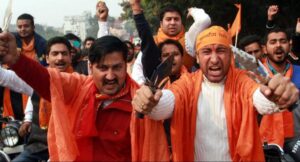 Moon Desk: In August 2019, PM Modi revoked the autonomous status of Jammu and Kashmir by revoking Article 370 and 35A of the Indian constitution, stripping the state of the special status it was granted after Partition. This action cleared the way for non Kashmiris to buy land in the region for the first time in decades. Scholars and Human rights activists expressed fears that this move was part of the government’s plans for a settler colonial project for Hindus in Kashmir. Not only did the revocation open up doors for non -natives to permanently settle in the region, it also allowed them to hold local jobs. Further, Modi’s government introduced a fast-track process through which “non-local Indians who fit certain nominal criteria could obtain domicile status in the state,” resulting in a “large number of non-native Hindu Indian citizens obtaining residency in the predominantly Muslim region in a short period of time.” Kashmiris have described this policy as an effort to change the demographics of Kashmir from a Muslim-majority state to one that has a Hindu majority. This process could entail ethnic cleansing.
Moon Desk: In August 2019, PM Modi revoked the autonomous status of Jammu and Kashmir by revoking Article 370 and 35A of the Indian constitution, stripping the state of the special status it was granted after Partition. This action cleared the way for non Kashmiris to buy land in the region for the first time in decades. Scholars and Human rights activists expressed fears that this move was part of the government’s plans for a settler colonial project for Hindus in Kashmir. Not only did the revocation open up doors for non -natives to permanently settle in the region, it also allowed them to hold local jobs. Further, Modi’s government introduced a fast-track process through which “non-local Indians who fit certain nominal criteria could obtain domicile status in the state,” resulting in a “large number of non-native Hindu Indian citizens obtaining residency in the predominantly Muslim region in a short period of time.” Kashmiris have described this policy as an effort to change the demographics of Kashmir from a Muslim-majority state to one that has a Hindu majority. This process could entail ethnic cleansing.
After failing to achieve the desired results of legitimacy and validation of the normalcy narrative by holding G-20 Tourism Meet in Srinagar. India faced global embarrassment as important countries like; China, Saudi Arabia, Turkey, Egypt, Indonesia, and Oman boycotted/ rejected to participate/low-level representation in the event on the pretext of the venue selected i-e Srinagar. Srinagar is part of the UNSC declared part of the disputed territory (IIOJK), Illegally Occupied by India which bars it to be designated to hold international or national events.
India is scheduling a national conference on legal services in Srinagar from June 29 to July 1, in which more than 200 judges from the Supreme Court and High Courts of various states of India will participate. It is for the first time that a conference of this stature is being organized on legal services in IIOJK. It is ironic to say that Indian judicial system has failed to provide justice to minorities, particularly Muslims and has been considered complicit to the growing HRVs in IIOJK. It is relevant to mention that Indian legal system especially the higher institutions of judiciary have failed to entertain dozens of writ petitions pending hearing in Indian SC and various other courts for last four years regarding abrogation of Article 370&35A in IIOJK. The weakness of Indian judicial infrastructure can be judged by the number of complaints registered against judges every week, averaging 300, but the Indian judiciary and Law Ministry remain indifferent.
Considering the above, India/ Judiciary has lost its legal credibility/ standing especially with regards to IIOJK as it has become an instrument of BJP/RSS government for a selective judicial approach to the Indian government’s illegal actions.
The international human rights bodies should take effective cognizance of the matter, and stop India from using its kangaroo courts to punish Kashmiri leaders who have been championing the Kashmiris’ just cause peacefully.
The UN Human Rights Council to appoint a Special Rapporteur to investigate the nature of crimes, appeals pending hearing and cases of judicial vandalism (Yasin Malik sentence).
The UN Security Council (UNSC) to exercise its power to refer the cases to the International Criminal Court (ICC). India is not a signatory to the ICC but the UNSC has the power to refer situations to the court.





